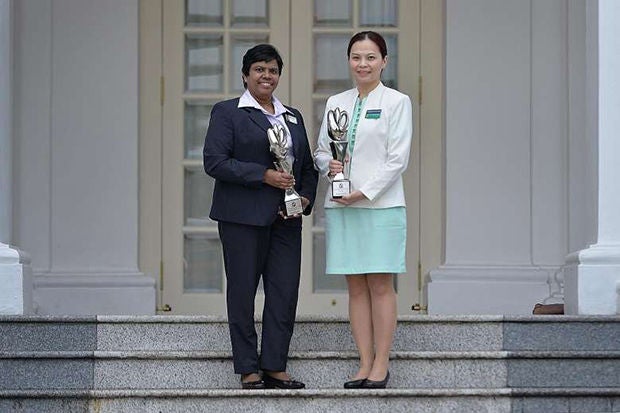
As a young nurse, Ms Velusamy Poomkothammal saw many emergency cases which could have gone better if someone nearby had just known what to do.
"They could have just put their hand there - arrested the bleeding, and the patient's condition would not have deteriorated," recalled the 57-year-old, who is currently assistant director of nursing at Khoo Teck Puat Hospital.
Seeing such patients was the trigger that made her go all out to teach first aid to students, teachers and members of the public, so no one would be at a loss in such a crisis.
Throughout her 40-year nursing career, Ms Velusamy has also constantly striven to improve the quality of care that she and her team can provide.
This includes letting young nurses try out more managerial roles beyond their usual bedside duties, so that they will better understand the big picture.
Yesterday, she and six others were honoured with the President's Award for Nurses, which was presented by President Tony Tan Keng Yam at the Istana.
Each received a trophy, a certificate and $10,000 to attend conferences and training programmes that will help with their career and personal development.
The annual award is the highest accolade in the profession, recognising outstanding nurses from both the public and private sectors.
This is the first year so many nurses have received the award since it started in 2000. There are only 52 recipients of the award to date. The ceremony was attended by around 650 people - many of them friends and family of the winners - from more than 70 healthcare institutions.
Another winner was Dr Lim Su-Fee, a senior nurse clinician and advanced practice nurse at the Singapore General Hospital.
Many of her patients are disabled and, as a specialist in rehabilitation medicine, Dr Lim helps them lead as normal lives as possible.
"It's not enough just to keep people who are sick and injured alive," she said, adding: "We must give them a life that is worth living."
She recalled a patient who had been immobilised after a stroke, and could only move his eyes.
"I found a way to communicate with him, despite his not being able to speak or move," she said, recounting the incident with pride.
Get the Health Buddy App
© 2025 SingHealth Group. All Rights Reserved.














 Get it on Google Play
Get it on Google Play